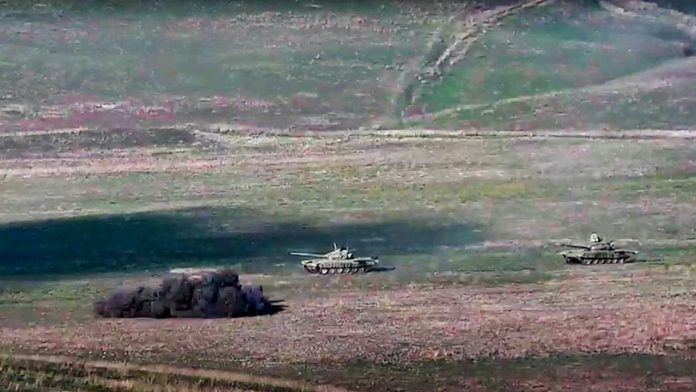A key player in the Caucasus, Russia on Sunday called for a ceasefire in the disputed province of Nagorno-Karabakh.
The Azerbaijani operation began at 7:10 a.m. local time along with the Nagorno-Karabakh “line of contact”. A deployment of ground and air forces “probably more massive than in the four-day war of April 2016,” deplored a Western military expert stationed in the Caucasus. Fighter planes, helicopters, combat drones, T-72 tanks, Azerbaijan has launched a large-scale offensive after having, last week, mobilized its reservists and requisitioned 4 × 4 pick-ups from private individuals.
The Azerbaijani side claims that this is a “counter-offensive operation”, in order “to suppress the combat activity of the Armenian armed forces”. Few observers believe this scenario. “Baku wants, as it did in 2016, to take back hectares of land in the occupied territories around Nagorno-Karabakh in order to boast to the people that it has obtained a victory. The intention is not to retake the province, which would be too cumbersome and costly: we do not see the use of semi-ballistic missiles, for example. This does not prevent this new rise in tension from carrying high risks,” says the Western military expert.
The Azerbaijani offensive would concentrate above all on the occupied districts of the south, notably that of Fizouli, on the Iranian border, where the geography is relatively flat. The information war was also raging. “According to preliminary reports, 16 soldiers were killed and more than 100 wounded” in the clashes, the Yerevan-backed Nagorno-Karabakh Defense Ministry said Sunday afternoon.
Cautionary note
The repetition of the 2016 scenario is worrying in that Azerbaijan cannot do less this time, in terms of reconquered territories. At that time there were 230 deaths on both sides, military and civilian. In other skirmishes in early July, further north on the international border between Armenia and Azerbaijan, major demonstrations took place in Baku to demand the reconquest of this province, which had been under the jurisdiction of their republic during the Soviet era, although populated mainly by Armenians. It was taken over by the Armenian side at the end of the 1988-1994 war.
Various sources in Baku and in the region believe that the Russians encouraged Aliev to go on the offensive
The President of Azerbaijan, Ilham Aliyev, must certainly satisfy the nationalist mood of his people, which he has been helping to maintain for years. “But it goes beyond that,” says a diplomat who is very familiar with the issue. “Aliev is also extremely frustrated by the Armenian Prime Minister, Nikol Pachinian, after having believed that he would make progress in the dialogue. Today he reproaches him for making populism by using Karabakh, for visiting the province too often, and for helping it to strengthen its defense infrastructure.
Turkish President Recep Tayyip Erdogan promised to “support our Azerbaijani brothers,” to which Armenian Prime Minister Nikol Pachinian responded with a warning against “aggressive” Turkish interference. On the diplomatic front, the key player in the conflict, Russia, has called for an “immediate ceasefire” and is currently conducting major military exercises in the North Caucasus. However, various sources in Baku and in the region believe that the Russians have encouraged Aliev to go on the offensive because Pachinian “irritates them a lot”. They blame him both for the success of the “Velvet Revolution” in the spring of 2018, and for taking “hostile” decisions against Russia, such as the imprisonment of former pro-Russian President Robert Kocharian. “The problem also stems from the lack of proactive international mediation, which should have been initiated after the July clashes,” said Olesya Vartanian, South Caucasus analyst for the International Crisis Group.
The UN Secretary-General, Antonio Guterres, like Washington, called on Sunday “to stop the fighting immediately”. Emmanuel Macron expressed his “deep concern” and said “his readiness to contribute to a peaceful and lasting settlement of the Nagorno-Karabakh issue”.
Source: Le Figaro

